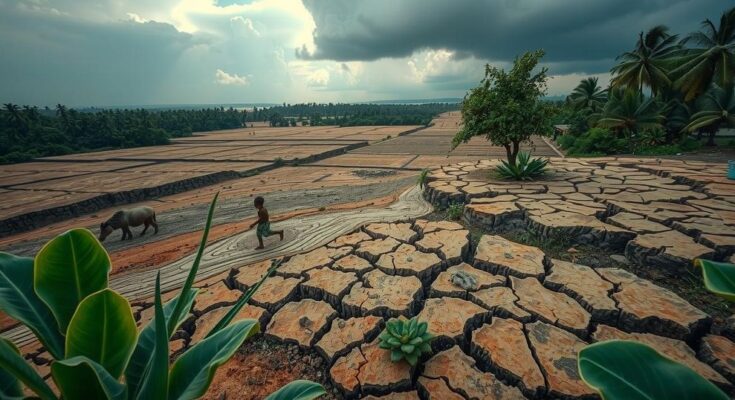More than 420,000 children in the Amazon basin are impacted by severe drought, leading to significant water scarcity and food insecurity. UNICEF has called for urgent climate financing to support affected communities. The drought, attributed to the 2023-2024 El Niño and other environmental factors, closed numerous schools and clinics, exacerbating risks of malnutrition and disease among children.
The United Nations reports that over 420,000 children in the Amazon basin are currently suffering from severe water scarcity and drought conditions in Brazil, Colombia, and Peru. This unprecedented drought, which began last year, is particularly impacting Indigenous communities that depend on waterways for survival. UNICEF Executive Director Catherine Russell emphasizes the devastating consequences on access to essential resources, as numerous schools and medical facilities have closed due to low river levels. UNICEF has expressed urgent concern regarding the food insecurity facing these communities, which increases the risk of child malnutrition and the spread of infectious diseases, particularly among young populations. Additionally, the organization has called for significant action from global leaders at the upcoming COP29 climate summit, stressing the necessity for enhanced climate financing aimed at protecting vulnerable children. The drought has led to widespread closures of educational and healthcare facilities, with over 1,700 schools and 760 clinics rendered inaccessible in Brazil alone. In Colombia, 130 schools were forced to suspend classes, and in Peru, more than 50 medical facilities are currently unreachable. UNICEF requires $10 million in the upcoming months to provide necessary support, such as access to clean water and health services. The recent climate crisis has been exacerbated by the ongoing El Niño phenomenon, which has contributed to insufficient rainfall across the entire Amazon basin, resulting in disrupted hydroelectric generation and agricultural distress. Analysts have indicated that additional factors, including forest fires and governmental policies, have compounded these issues. However, Brazilian Environment Minister Marina Silva has reported a 30 percent reduction in deforestation rates, indicating potential progress in managing the environmental crisis under the current administration.
The escalating climate crisis has caused unprecedented drought conditions in the Amazon basin, severely affecting over 420,000 children residing in Brazil, Colombia, and Peru. This situation has led to significant water shortages, impacting essential services such as education and healthcare. The ongoing El Niño event has compounded the drought, further straining local resources and increasing the risk of child malnutrition and disease. In light of these challenges, UNICEF is advocating for comprehensive climate financing solutions at the forthcoming COP29 summit.
In summary, the UN has highlighted the dire situation faced by over 420,000 children in the Amazon due to severe drought conditions stemming from climate change and the El Niño phenomenon. The immediate need for increased climate financing and essential resources is critical to mitigate the adverse impacts on children and communities in Brazil, Colombia, and Peru. As global leaders prepare for the COP29 summit, decisive actions are required to address the escalating climate crisis and its effects on vulnerable populations.
Original Source: www.aljazeera.com




